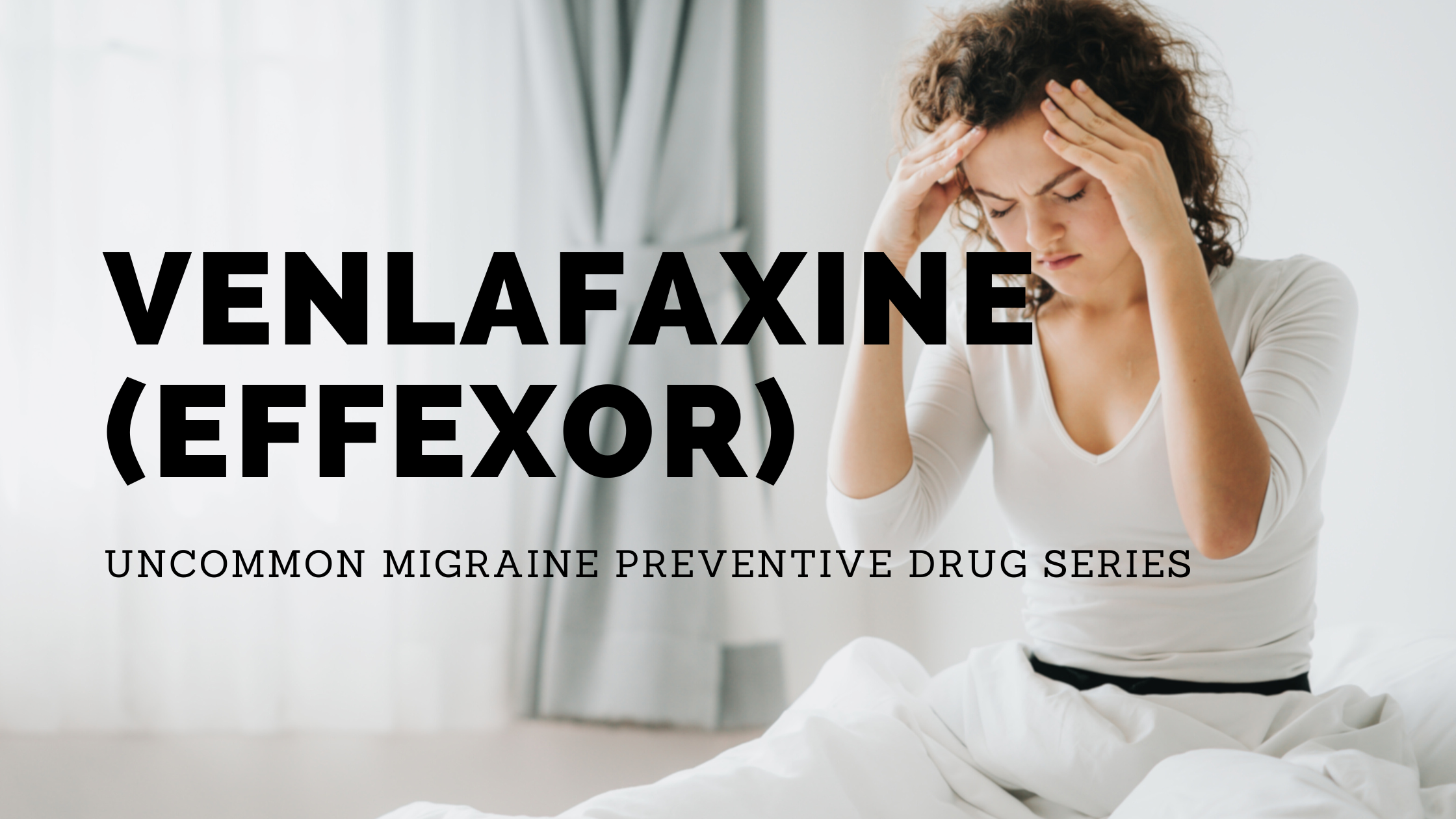Venlafaxine (Effexor): A Potential Off-Label Treatment for Migraine
Posted on April 30 2023,

Click for the full list of the 50 uncommon migraine preventives
What is Venlafaxine?
Venlafaxine is a serotonin-norepinephrine reuptake inhibitor (SNRI). Therefore, it inhibits the reuptake of serotonin and norepinephrine.
Venlafaxine is a prescription medication that is FDA-approved to treat depression, social anxiety disorder, and cataplexy. Off-label, venlafaxine can be used for attention deficit disorder, fibromyalgia, diabetic neuropathy, complex pain syndromes, hot flashes, post-traumatic stress disorder, obsessive-compulsive disorder, premenstrual dysphoric disorder, and, of course, migraine prevention.
How Does Venlafaxine Work?
Venlafaxine works by inhibiting the reuptake of serotonin, norepinephrine, and dopamine thereby increasing their levels in the brain. However, dosing is important too. Venlafaxine is essentially a selective serotonin reuptake inhibitor (SSRI) at 75 mg, and with higher doses such as 225 mg/day, it has significant effects on the norepinephrine transporter in addition to serotonin. Research also shows that higher doses of venlafaxine are more effective than lower doses (see below). Higher doses could come at increased risk of adverse effects so talk about this with your neurologist.
Venlafaxine as a Potential Treatment Option for Migraine
As stated earlier, venlafaxine is not approved by the FDA for the treatment of migraine, but it is still prescribed off-label for chronic, refractory cases at the discretion of the prescribing physician.
In one study published in the Journal of Head and Face Pain, venlafaxine was found to be more effective than placebo and safe as a migraine preventive. Furthermore, it was found that the 150 mg dose was more effective than the 75 mg dose.
In a randomized, double-blind, crossover study, venlafaxine was found to have similar efficacy and less adverse effects when compared to a common firs-line migraien preventive amitriptyline.
Venflafaxine can be combined with other medications for migraine prevention. Some find this works great for vertigo symptoms that may be associated with migraine attacks, particularly patients with vestibular migraine.
Potential Side Effects of Venlafaxine
Common side effects of milnacipran include nausea, headache, dry mouth, insomnia, and constipation. If you experience any severe side effects or have concerns about taking this medication, it is important to speak with your healthcare provider.
There is an FDA black box warning against venlafaxine as it can increase suicidality, cause depression exacerbation, hypomania/mania, and serotonin syndrome.
Other Considerations for Venlafaxine
Must be titrated up and weaned off.
Do not use venlafaxine if you have used an MAO inhibitor in the past 14 days.
Risk of serotonin syndrome if used with triptans, but unlikely. Speak to your healthcare provider.
This is a cursory understanding of uncommon migraine medications. This is only to be used as a resource to go to your neurologist with.
Fri, Apr 18, 25
Weather Conditions & Migraine Attacks: Is there a relationship?
This meta-analysis found that weather conditions, especially temperature and ambient pressure changes as well as increased levels of certain air pollutants (PM10, PM2.5, NO2, CO, and O3), are significantly associated...
Read MoreFri, Apr 18, 25
Understanding the Link Between Endometriosis and Migraine
Understanding the Link Between Endometriosis and Migraine: New systematic review and meta-analysis reveals a significant connection between these two conditions and what it means for patients.
Read More

